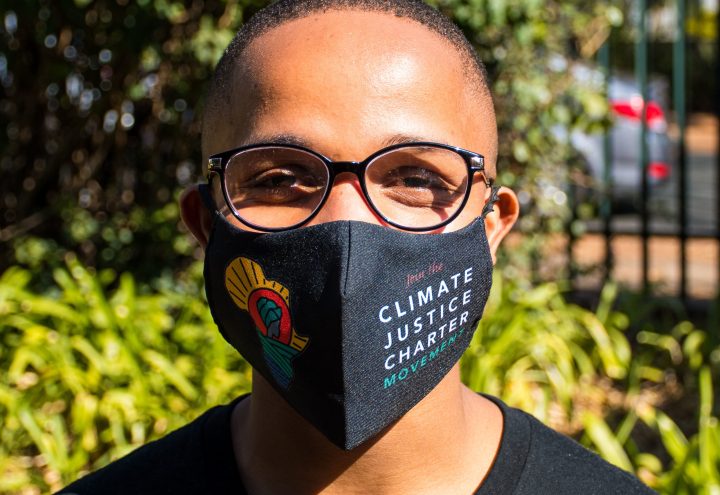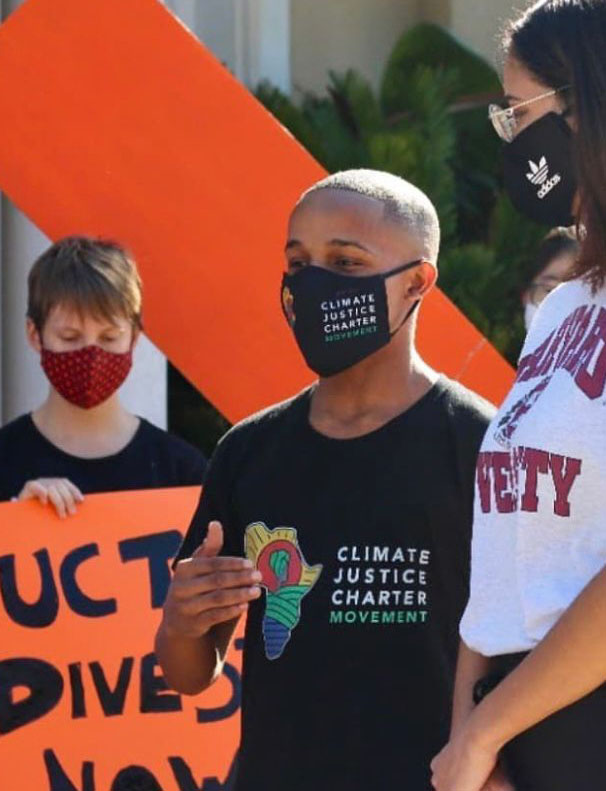OUR BURNING PLANET
EcoMaverick: The young climate change activist whose vision was forged by growing up in Soweto

Sibusiso Mazomba had first-hand experience of how low-income and informal communities are more vulnerable to the effects of climate change.
Sibusiso Mazomba is 19 years old. His climate activism began in 2019 when he learnt of the severity and urgency of the climate crisis after participating in youth programmes at the South African Institute of International Affairs (SAIIA), but he was subconsciously building a grassroots approach to his activism long before.
Mazomba grew up in Soweto, so he had first-hand experience of how low-income and informal communities are more vulnerable to the effects of climate change.
“We live in South Africa, which is one of the most unequal countries in the world, and climate change poses a risk of entrenching and deepening the inequality that already exists.
“So my stance was just on making sure that voices from underprivileged communities, voices from marginalised communities, voices from Soweto are represented in policy.”
The recently published Intergovernmental Panel on Climate Change (IPCC) Assessment Report Six gives the best estimate of global warming to date, to the value of 1.1°C above pre-industrial levels.
Coleen Vogel and Francois Engelbrecht, climatology experts and contributing authors on several IPCC reports, told Our Burning Planet that this is likely the warmest Earth has been in 125,000 years and that this rapid warming cannot be explained by any natural process.
Every one of us will experience the repercussions of global warming and the subsequent climate crisis (such as heat, droughts and flooding), but the recent Gauteng Quality of Life Survey found that informal dwellings are more likely to be damaged by extreme events than formal dwellings, in part due to poor spatial planning and lack of adequate resources.
“With climate change, there’s going to be so much environmental damage,” says Mazomba. “Infrastructure is going to be damaged and jobs are going to be lost. And it is people in vulnerable communities who are going to be impacted.
“It means you don’t have the resources to withstand the impacts of climate change.”
Mazomba says that low-income communities don’t have the infrastructure to survive extreme weather events or the education to know how to deal with the threats of climate change. Additionally, poverty affects young people’s ability to participate in class, and how they are able to learn.
A concrete example of how vulnerable communities are affected by the climate crisis is what is happening to women smallholder farmers in Soweto.
In Soweto many women farm small patches of community gardens to provide fruits and vegetables to their local schools and surrounding community.
Mazomba explains that these women smallholder farmers have been struggling; climate change has led to crop failures, which means these women can’t provide produce to their communities.
“If climate change is threatening these patches of land and the produce and the viability of women smallholders, it means local children in those townships are going to suffer. Where are they going to get the food?” asks Mazomba.
“Resources are also so limited, so it’s really important that we prioritise and protect what we already have, instead of looking at new prospects.”
Along with being a youth coordinator at SAIIA, Mazomba was one of the lead drafters of the City of Johannesburg Climate Action Plan and is a project lead in the upcoming National Youth Climate Action Plan, due to be released in October.
When he was working on these climate plans, he had to do research on existing policies around climate change.
“I saw that there was nothing about the voices of marginalised communities,” said Mazomba, “and that didn’t make sense to me, because it’s the underprivileged communities that are going to bear the brunt of climate change in the future.
“So, I think that’s what resulted in me taking a greater interest in trying to speak about issues of climate change, making sure that the people who are most affected – grassroots communities that bear the impacts of climate change – are represented in policy.”
Mazomba is studying marine biology, statistics and oceanography at the University of Cape Town and is set to leave his home country for the first time to represent South Africa at the Pre-COP26 youth conference in Milan, Italy, the final preparatory meeting ahead of the forthcoming 26th UN Climate Change Conference of the Parties (COP26).
Mazomba’s contribution to the Pre-COP
The Youth4Climate: Driving Ambition meeting, which will be held between 28-30 September in Milan, will include nearly 400 young delegates (aged 19-29) from 197 countries – part of the United Nations Framework Convention on Climate Change (UNFCCC).
The aim of the youth summit is to allow young people from all over the world to give their input on how we can call for a greater climate response and to develop concrete proposals for Pre-COP26 in Milan and COP26 in Glasgow.
“The declaration that we come up with will then be presented at COP26,” explains Mazomba. “But more importantly, it’s to allow young people to forge partnerships, to see how we can work together even after the conference.”
The Italian ministry gave the delegates four themes: youth driving ambition, non-state actors’ engagement, sustainable recovery and climate conscious society. The delegates were divided into working groups where each theme will be explored.
As one of three delegates from South Africa, Mazomba is part of the climate-conscious society working group.
“Some of the suggestions that have come out so far are making sure that grassroots communities have the resources and the capacity to engage in climate discourse,” says Mazomba, “and also giving a platform to young people to present their lived experiences.
“Media so far is not very inclusive. When they talk about climate change, it’s always, you know, we’re gonna die, we’re close to the two-degree threshold… it increases that climate anxiety.
“So just making sure that, you know, climate change can be mainstreamed, but in a way that paints a positive picture, but also paints a picture of what is happening on the ground.
“What are young people doing about it? What are stakeholders? What is government doing about it, and how are we working together to mobilise greater action against it?”
Mazomba will also discuss how countries can implement comprehensive climate change education.
“They did teach us about climate change at school… in an environmental sort of lens, which then doesn’t really draw that interest as to, how is climate change affecting me as a young person living in Soweto? How is climate change affecting women? What is the link between climate change and vulnerable communities?”
So at the youth summit, Mazomba is going to discuss how our national curriculums don’t just cover the environmental impacts of climate change, but also the socioeconomic implications.
“To allow young people to engage in climate change, so that they can be catalysts for change in their own communities,” says Mazomba.

Sibusiso Mazomba (left) with fellow activists at the Divest UCT protest organised by Fossil Free UCT, the UCT Green Campus Initiative, outside the Bremmer building at UCT. (Photo: Sibusiso Mazomba)
Why should young people have a place at the table?
Many argue that young people are too naïve or uninformed about climate change and socioeconomic issues to be given a seat at decision-making tables, or the opportunity to attend the Pre-COP26.
Mazomba responds that, “Young people all across the world have been leading the movement for climate change. The urgency that we’re seeing now is because of the school strikes. We are the experts of our realities when it comes to climate change. And we’ve demonstrated that we are concerned about issues that matter most to us.”
Mazomba thinks this urgency in the youth population is, “Because we are the custodians of tomorrow. We’re the ones that are going to inherit the world of tomorrow, so making sure that that world is fit for us to live in and for future generations to live in is really important.”
Mazomba says while older people in his family and community support his work and understand climate change exists, their priorities lie elsewhere.
“They do believe [climate change exists],” says Mazomba, “We’re experiencing the impact of climate change, our weather conditions are changing drastically. But… it’s not really a priority to them, they pay more attention to issues of crime, poverty and gender-based violence.”
Climate justice is social justice
A big source of contention in less developed countries like South Africa is that we don’t have the resources and budget to invest in sustainable solutions, or we have bigger socioeconomic issues to deal with first.
Mazomba’s response to that is, “First, we must recognise that climate justice is inextricably linked to social justice and economic justice.
“Second to that is making sure that we adopt intersectional approaches… with intersectionality, it means that we’re not forcing a community to put all their issues aside and focus on climate change.
“The key incentive there is for us to focus on all these issues, [realise] what the links between the issues are, and how we can adopt an integrative framework to fighting climate change.” DM/OBP





















 Become an Insider
Become an Insider
Comments - Please login in order to comment.